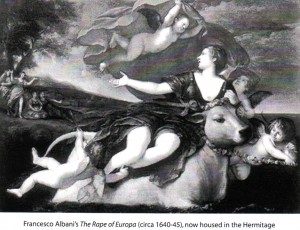 A central issue in “Russian Ark” is the spread of enlightenment through and the rise of the nation-state, and with it various forms of nationalism. Accompanying the age of the nation-state-first its emergence from under the tutelage of Empire, and second its ferocious return after the fall of Soviet-styled socialism – there has been an explosion of discourses about nationalism and nostalgia.
A central issue in “Russian Ark” is the spread of enlightenment through and the rise of the nation-state, and with it various forms of nationalism. Accompanying the age of the nation-state-first its emergence from under the tutelage of Empire, and second its ferocious return after the fall of Soviet-styled socialism – there has been an explosion of discourses about nationalism and nostalgia.
“Russian Ark” begins with the anxiety produced by a sense of 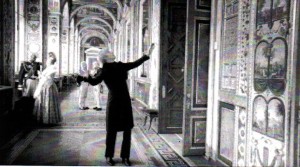 disorientation. The establishing shot is one of complete darkness accompanied by a cacophony of sounds-the wind, a ship’s foghorn, the tuning of instruments, the sound of moving water, muffled laughter, and distorted musical accents that merge into one another to become indistinguishable. This haunting background sound reappears throughout the remaining 90 minutes of film. A voice (Sokurov’s own) emerges out of the darkness and, almost as if in an internal monologue, seeks to orient itself: “I open my eyes and I see nothing, I remember only that there was some calamity…but I just can’t remember what happened to me.” Alluding to the opening lines of Dante’s “Inferno” (and
disorientation. The establishing shot is one of complete darkness accompanied by a cacophony of sounds-the wind, a ship’s foghorn, the tuning of instruments, the sound of moving water, muffled laughter, and distorted musical accents that merge into one another to become indistinguishable. This haunting background sound reappears throughout the remaining 90 minutes of film. A voice (Sokurov’s own) emerges out of the darkness and, almost as if in an internal monologue, seeks to orient itself: “I open my eyes and I see nothing, I remember only that there was some calamity…but I just can’t remember what happened to me.” Alluding to the opening lines of Dante’s “Inferno” (and 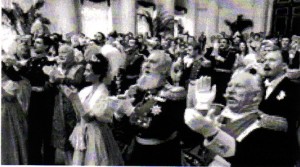 Pushkin’s allegorical images of the flood of St. Petersburg in 1824), this lost soul seems to have strayed from the course of time. “There is no beginning or ending to this film…” The voice persona will remain estranged from the “action” of the film, following a group of eighteenth century officers and ladies through the back entrance of the Hermitage which was the Winter Palace of the tsars. To the right and to the left one can see the film shots and below it will be shown the image list of the sights of St. Petersburg of 19-th century.
Pushkin’s allegorical images of the flood of St. Petersburg in 1824), this lost soul seems to have strayed from the course of time. “There is no beginning or ending to this film…” The voice persona will remain estranged from the “action” of the film, following a group of eighteenth century officers and ladies through the back entrance of the Hermitage which was the Winter Palace of the tsars. To the right and to the left one can see the film shots and below it will be shown the image list of the sights of St. Petersburg of 19-th century.
Peter the Great not only founded the city, but also constructed the first incarnation of the Winter palace and the museum, which was then a Kunstkammer, library, and natural history museum for his Academy of Sciences. Catherine the Great was the founder of the Hermitage, and bought over 250 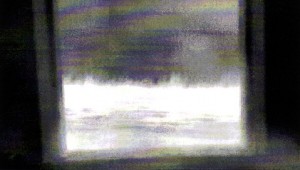 paintings in 1764 to begin the collection. Tsar Nicholas I opened the New Hermitage in 1852 and provided “public” access to the museum. The reign of Nicholas II marks the end of the Hermitage’s double role as museum and home to the tsars. It also marks the end of the epoch of Petrine reforms, and what the film presents as the splitting of Russia from Europe during the Soviet and post-Soviet periods.
paintings in 1764 to begin the collection. Tsar Nicholas I opened the New Hermitage in 1852 and provided “public” access to the museum. The reign of Nicholas II marks the end of the Hermitage’s double role as museum and home to the tsars. It also marks the end of the epoch of Petrine reforms, and what the film presents as the splitting of Russia from Europe during the Soviet and post-Soviet periods. 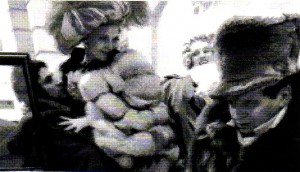
The film mimics this historical progression and although “Russian Ark” (island) of the tsar emphasizes theatricality, it doesn’t spin it out of control into random. Instead the film hinges on the physical and historical map of the hermitage and the Winter Palace showing various periods of nineteenth century, the siege of Leningrad during WWII, contemporary Petrograd and back and forth in time. “Russian Ark” demonstrates how nostalgia for an imaginary past often produces various forms of erasure and national myths of origin. It treats history not as fact but as a poetic construction that has drifted in and out of Europe via metaphor, allusion, and myth.
What do you think about this subject, my cherished reader?
no images were found
Hi Valechka, you have a great album! How are you doing?
Lida
Hi, Lida,
Nice to hear from you again. Thank you for a wonderful comment about my web site. Please, read more of it and you will know a lot about me and Janko, and our travels and interests. There are a lot of interesting videos and photos. This cover culture. history. music. Welcome to my web site. Be my guest, enjoy yourself.